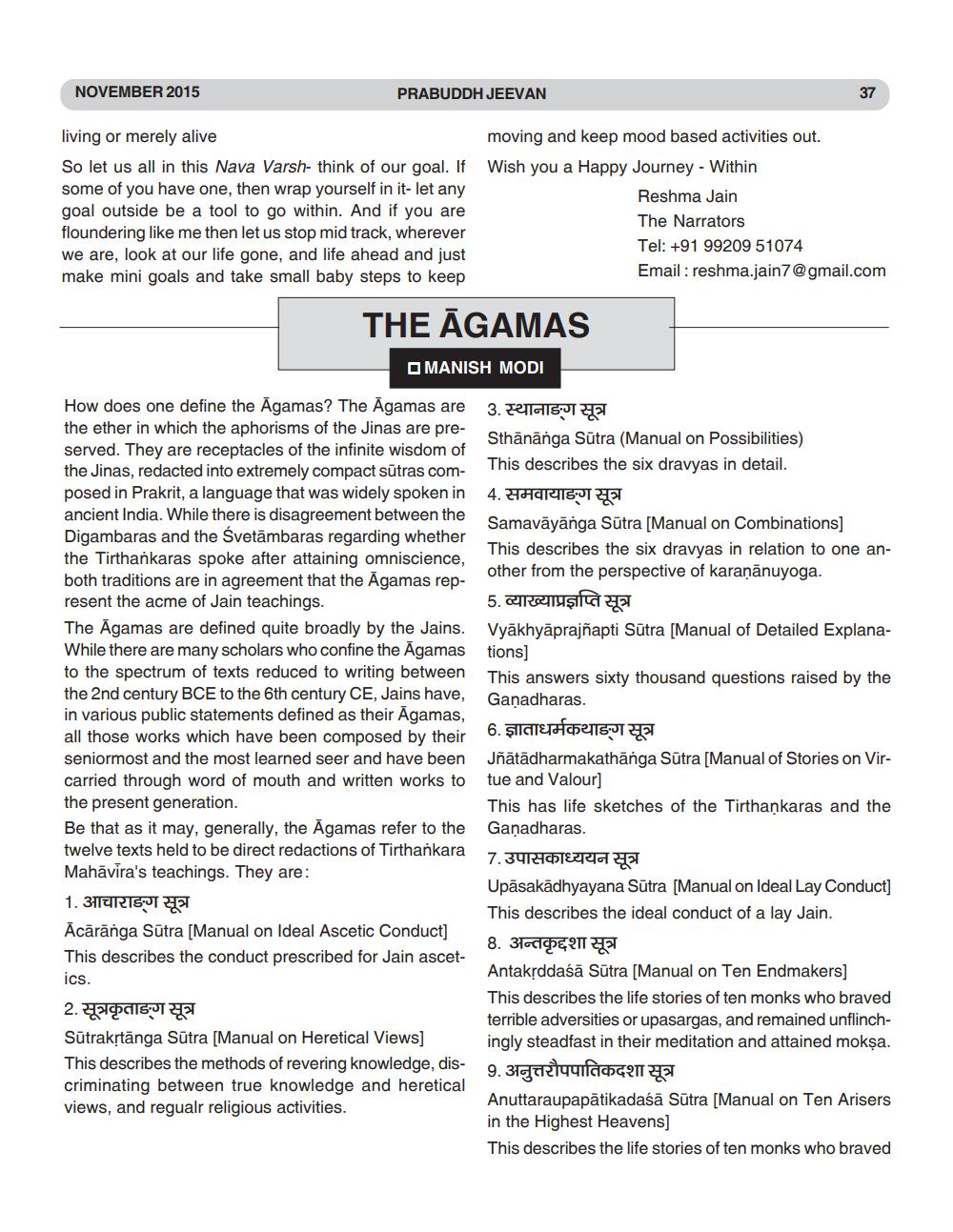________________
NOVEMBER 2015
PRABUDDH JEEVAN
31
living or merely alive So let us all in this Nava Varsh- think of our goal. If some of you have one, then wrap yourself in it- let any goal outside be a tool to go within. And if you are floundering like me then let us stop mid track, wherever we are, look at our life gone, and life ahead and just make mini goals and take small baby steps to keep
moving and keep mood based activities out. Wish you a Happy Journey - Within
Reshma Jain The Narrators Tel: +91 99209 51074 Email: reshma.jain7@gmail.com
THE ĀGAMAS
MANISH MODI
How does one define the Agamas? The Agamas are 3. 5.TEL the ether in which the aphorisms of the Jinas are pre
Sthānānga Sutra (Manual on Possibilities) served. They are receptacles of the infinite wisdom of the Jinas, redacted into extremely compact sūtras com
This describes the six dravyas in detail. posed in Prakrit, a language that was widely spoken in 4. HARIS ET ancient India. While there is disagreement between the
Samavāyānga Sūtra [Manual on Combinations] Digambaras and the Svetāmbaras regarding whether
This describes the six dravyas in relation to one anthe Tirthankaras spoke after attaining omniscience,
other from the perspective of karaṇānuyoga. both traditions are in agreement that the Āgamas represent the acme of Jain teachings.
5. व्याख्याप्रज्ञप्ति सूत्र The Agamas are defined quite broadly by the Jains. Vyākhyāprajñapti Sūtra [Manual of Detailed ExplanaWhile there are many scholars who confine the Āgamas tions] to the spectrum of texts reduced to writing between This answers sixty thousand questions raised by the the 2nd century BCE to the 6th century CE, Jains have, Ganadharas. in various public statements defined as their Āgamas, all those works which have been composed by their 6. SIICITETH CHESTE seniormost and the most learned seer and have been jñātādharmakathānga Sūtra [Manual of Stories on Vircarried through word of mouth and written works to tue and Valour] the present generation.
This has life sketches of the Tirthankaras and the Be that as it may, generally, the Agamas refer to the Ganadharas. twelve texts held to be direct redactions of Tirthankara 7.उपासकाध्ययनसूत्र Mahāvira's teachings. They are:
Upāsakādhyayana Sūtra [Manual on Ideal Lay Conduct] 1.31URISUT ET
This describes the ideal conduct of a lay Jain. Ācārānga Sūtra [Manual on Ideal Ascetic Conduct]
8. अन्तकृद्दशा सूत्र This describes the conduct prescribed for Jain ascet
Antakrddaśā Sūtra [
Manual on Ten Endmakers] ics.
This describes the life stories of ten monks who braved 2. सूत्रकृताङ्ग सूत्र
terrible adversities or upasargas, and remained unflinchSūtrakstānga Sūtra [Manual on Heretical Views]
ingly steadfast in their meditation and attained mokşa. This describes the methods of revering knowledge, dis
9. अनुत्तरौपपातिकदशा सूत्र criminating between true knowledge and heretical
Anuttaraupapātikadaśā Sūtra [Manual on Ten Arisers views, and regualr religious activities.
in the Highest Heavens] This describes the life stories of ten monks who braved




